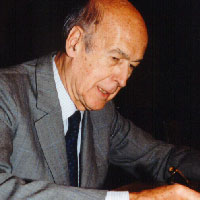
VALERY GISCARD D’ESTAING
Former President of
France |
 BACK BACK |
|
  SPEAKER: VALERY GISCARD D’ESTAING
SPEAKER: VALERY GISCARD D’ESTAING
Former President of
France
After serving in the French Resistance, Valery Giscard d'Estaing enlisted
at the age of 18 and participated in the French and German campaigns,
for which he was awarded the Croix de Guerre.
He completed his studies at the Ecole Polytechnique and the Ecole Nationale
d'Administration, and joined the Inspection Generale des Finances in
1952, where he pursued an administrative career until 1956.
He was Deputy Director first to the Office of the Minister of Finance,
and then to Edgar FAURE, President of the Council of Ministers.
1956 - 1974: ELECTIVE OFFICES
Elected Member of Parliament in 1956. Re-elected four times to the National
Assembly,serving until 1974.
Elected Mayor of Chamalieres (Puy-de-Dome) in 1967 and 1971, serving
until 1974.
Elected to the General Council of the Puy-de-Dome, serving from 1958
to 1974, elected again in March 1982.
GOVERNMENT FUNCTIONS
1959 to 1962: Secretary of State for Finance in the Finance Ministries
of Antoine PINAY and Wilfrid BAUGARTNER
1962 to 1966: Minister of Finance and Economic Affairs in the DEBRE
and POMPIDOU Governments under President Charles de GAULLE
1969 to 1974 Minister of Economy and Finance in the CHABAN-DELMAS and
MESSMER Governments under President Georges POMPIDOU
POLITICAL ACTIVITIES
In 1965, he founded the CLUBS PERSPECTIVES ET REALITES, clubs for discussion
and proposal of political ideas.
In 1966, he founded the National of Independent Republicans, which in
1977 became the Republican Party (PARTI REPUBLICAIN).
1974-1981: PRESIDENT OF THE FRENCH REPUBLIC
During his term of office, Valery GISCARD d'ESTAING played a crucial
role in several international initiatives, among which were:
the Creation of the European Council, which regularly brought together
the heads of government and the heads of state of the European Community,
first in Paris in 1974.
Election by universal suffrage of the EUROPEAN PARLIAMENT (decision
of the Council of Ministers of the EEC in 1976; first elections in Europe
in June 1979).
Creation of the EUROPEAN MONETARY SYSTEM, a project that was presented
jointly by France and Germany in 1978, and put into operation by decision
of the European Council in Paris in 1979.
Creation of world summits of chiefs of state and heads of government
of the principal industrialised democracies. He organised the first
summit at RAMB0UILLET (France) in 1975, and participated in the meetings
until 1980 at VENICE.
Proposal of NORTH-SOUTH dialogue. The first North-South Conference took
place in PARIS in December 1975.
Proposal to create a DISARMAMENT INSTITUTE in 1978 presented to the
General Assembly of the United Nations. The Institute was established
in GENEVA in December 1980.
Participation by France in the DISARMAMENT COMMITTEE in Geneva since
1979.
Defining a concerted Western policy on oil imports at the Council of
Europe, Strasbourg, and the Tokyo summit in June 1979.
On 14 December 2001, he is appointed by the European Council as Chairman
of the Convention on the Future of Europe.
POLITICAL ACTIVITES
1982: He creates the COUNCIL FOR THE FUTURE OF FRANCE.
1984: He is designated to head the CLUBS PERSPECTIVES ET REALITES which
he founded, and which became in 1995, the Parti Populaire pour la D_mocratie
Fran_aise (PPDF), one of the six parties which make up UDF.
1989 to 1996: President of the UDF (Union pour la D_mocratie Fran_aise),
a confederation of six parties from the centre and the centre-right
represented in the Parliament.
1989 to 1997: President of the international EUROPEAN MOVEMENT
1992: On 19 November 1992, he is elected President of the APCR
(Association des Pr_sidents de Conseils R_gionaux).
Since 1998: On 23 October 1997, he is elected International President
of the Council of European Municipalities and Regions and is re-elected
for a three-year mandate in Lisbon the following year.
COMMITTEE FOR THE MONETARY UNION OF EUROPE (CMUE)
In 1986, he creates, with former Chancellor Helmut SCHMIDT, the Committee
for the Monetary Union of Europe, of which they are co-chairmen. This
Committee includes 17 members from the EC countries (politicians, bankers,
business leaders). In July 1988, they published the « Programme
for Action », the outcome of its works from 1986 to June 1988,
the proposals of which were the basis of the activities of the Delors
Committee from July 1988 to April 1989. The CMUE is currently studying
new means to promote and accelerate the realisation of the European
Monetary Union.
Since 1995, he has been a member of the Real Academia de Ciencias Economicas
y Financieras (Spain).
| European Speakers
Bureau |
phone +32 (0)2 646 13 83 | fax +32 (0)2 646 41
73
Rue Americaine 221, 1050 Brussels Belgium |
|







